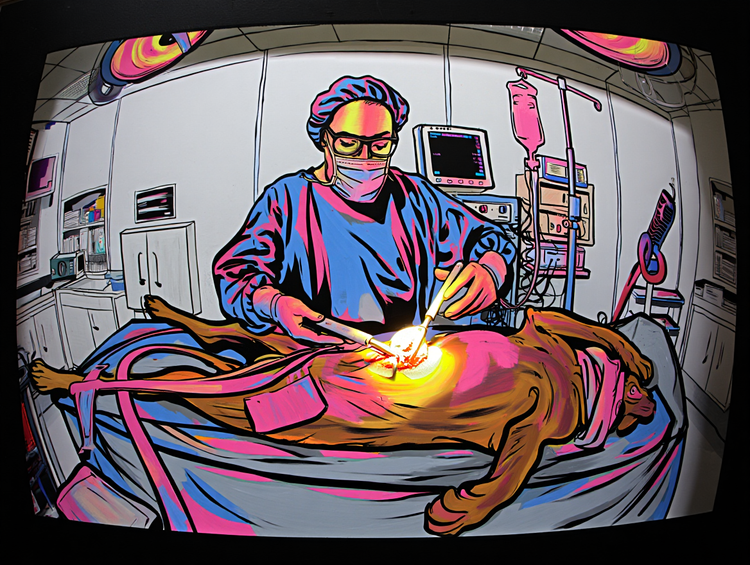Thrown Over the Fence

It's so annoying to not be able to figure something out. My job as a veterinarian is to answer questions correctly. In school, we're drilled over and over again with multiple choice questions. There's always a right answer. But in reality, medicine isn't like that. It's often frustrating, like a crossword puzzle clue you just can't solve. Mystery patients aren't as fun as House makes them seem.
In school, you might get a test question with an animal's age, gender, and breed followed by an account of their clinical signs. Something like this:
The patient is a four year-old, female spayed lab mix with acute onset muscle fatigue.
This was a real patient of mine recently. In school, you'd be asked to form a list of possible explanations for the condition. To get perfect credit (something all vet students crave, even the "slackers"), the list needs to be comprehensive (i.e. long!). It is actually fun to do this in school, because no one is depending on you, and no one is dying.
It's another thing entirely to consider 45 differential diagnoses as fatigue sets in at the end of a long shift, more than a decade since you've taken Neurology. Doubly so when your clients have only one nickel to rub against itself. They think a neighbor threw poison over the fence, but they always think that. Truthfully, I almost never see intentional toxicities. So many people suggest ridiculously sinister actions by neighbors that it feels like a game of Clue.
Not that it never happens, but Hanlon's razor states, "Never attribute to malice what can be explained by stupidity". As a guide for formulating differential diagnoses, it works pretty well. Especially around stupid people.
Still, the dog is sick, and the clock is ticking. It does you no good to get sidetracked correcting public misperception. A diagnosis list one differential long is the reason they're coming to you for help. If and when you can figure out what's wrong with it. If it doesn't get better or die by the time you may or may not have any idea why it's sick. Medicine is a bit messy.
Undisciplined thoughts start popping into your head. Differentials that just sort of seem half-right. Myasthenia gravis? Tick paralysis? This is Daniel Kahneman's "thinking fast". Maybe one of these quick hits convinces you to throw a treatment plan at it. What can you do? No money for diagnostics, anyway! And if you're lucky, maybe it gets better (with or despite your help).
But if you have a minute, maybe do an online search (trusted resources only!). Or flip through a textbook (requires brainpower), maybe you consult a smarter-than-you colleague (requires humility). Maybe they have an insight on your case, but then you need to go back to the beginning and repeat the whole process. Thinking "slow". It's harder. It's annoying. Sometimes it leads to something, sometimes it doesn't. There's often a lack of closure in this business.
So what the hell, treat the treatable. This isn't vet school, after all. This is you doing the best you can with what you have. And you don't have much. It's not throwing in the towel, it's making things work for the people without a ton of disposable income. As it happens, they have just enough to cover a relatively new (and relatively inexpensive) treatment, IV lipid emulsion, which can bind a variety of toxins. If you're wrong, it's a low risk waste of money. If you're right, maybe it works. Does this make sense? Who knows! You're the doctor, just sound confident.
You order the lipids and round your patient off to the night doctor. Head home and try to force the sight of that progressively weakening patient out of your mind (takes at least a few hours). You hope the dog gets better, but it's out of your hands now. You hope to not feel guilty if it doesn't go well. You hope the clients aren't outraged that you spent their money on a hare-brained therapy. Don't let it keep you up! You need some rest to do it all again tomorrow.
When you get back to the clinic, the patient's not there. Terrible outcome? No! She's been discharged! She had an immediate, full recovery after the intravenous lipid therapy. Damn! The only explanation is a toxicity. It has to be. Nothing else would resolve that quickly. And the most common toxin that would do that to a dog is a horse dewormer that is excreted fecally. And they do live right next to a horse farm. Well, I'll be damned, the neighbors did poison the dog, albeit unintentionally! I guess Hanlon was almost right. He should have said, "Never attribute to malice what can be explained by coprophagy."





Comments ()